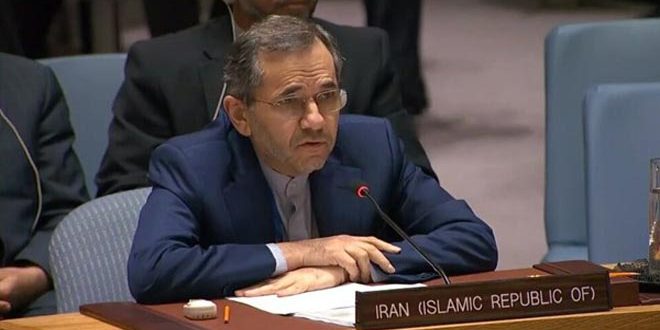Iran’s Permanent Representative to the United Nations, Ambassador Majid Takht Ravanchi has affirmed that the unilateral unjust embargo measures imposed on Syria would prolong the crisis in it, and increase the suffering of its people, especially due to the difficulties of the Coronaviruses pandemic outbreak.
During a meeting of the International Security Council, Takht Ravanchi said that the recent report of the Secretary-General of the United Nations Organization on the situation in Syria stresses the need to accelerate the mobilization of international efforts to resolve this challenge which is represented in the suffering of its people.
He noted that the humanitarian aid to indigent individuals cannot alone solve the problem and this step cannot be a substitute for basic steps that are vital to securing peace, security and sustainable stability in this country.
He stressed the need to guarantee Syria’s full sovereignty and territorial integrity through eliminating terrorists, ending the foreign occupation, providing security for the Syrian borders, rebuilding the vital infrastructure in Syria, providing conditions conducive to the return of refugees and the displaced, and achieving more progress on the track of the political solution.
Takht Ravanchi added that some countries, which have not been able to achieve their goals in Syria through military means or political tools, have been trying to implement them through unfair embargo measures.
He stressed that using food and medicine as a weapon, and threatening the food security of people is unacceptable and is legally considered as a blatant violation of the goals and the principles of the United Nations organization, and for this reason, these measures should be canceled immediately.
Takht Ravanchi renewed Iran’s commitment to the political solution to the crisis in Syria and to support its government and people to ensure its unity, sovereignty and independence.
Source : SANA







